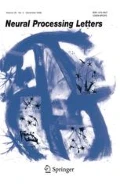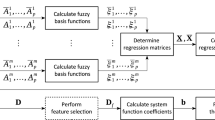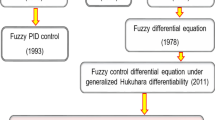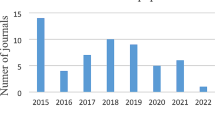Abstract
This paper considers the design of state estimator for Takagi–Sugeno (T–S) fuzzy neural networks with mixed time-varying interval delays. The mixed time-delays that consist of both the discrete time-varying and distributed time-delays with a given range are presented. The activation functions are assumed to be globally Lipschitz continuous. By using the Lyapunov-Krasovskii method, a linear matrix inequality (LMI) approach is developed to construct sufficient conditions for the existence of admissible state estimator such that the error-state system is exponentially globally stable. To avoid complex mathematical derivations and conservative results, a new hybrid Taguchi-genetic algorithm method is integrated with a LMI method to seek the estimator gains that satisfy the Lyapunov-Krasovskii functional stability inequalities. The proposed new approach is straightforward and well adapted to the computer implementation. Therefore, the computational complexity can be reduced remarkably and facilitate the design task of the estimator for T–S fuzzy neural networks with time-varying interval delays. Two illustrative examples are exploited in order to illustrate the effectiveness of the proposed state estimator.
Similar content being viewed by others
References
Haykin S (1999) Neural networks: a comprehensive foundation. Englewood Cliffs. Prentice-Hall, Bergen
Rutkowski L (2004) Adaptive probabilistic neural networks for pattern classification in time-varying environment. IEEE Trans Neural Netw 15(4): 811–827
Cohen M, Grossberg S (1983) Absolute stability of global pattern formation and parallel memory storage by competitive neural networks. IEEE Trans Syst Man Cybern 13(5): 815–826
Baldi P, Atiya AF (1994) How delays affect neural dynamics and learning. IEEE Trans Neural Netw 5(4): 612–621
Hochreiter S (1988) The vanishing gradient problem during learning recurrent neural nets and problem solutions. Int J Uncertain Fuzziness Knowl Syst 6(2): 107–116
Squartini S, Hussain A, Piazza F (2003) Attempting to reduce the vanishing gradient effect through a novel recurrent multiscale architecture. Int Joint Conf Neural Netw 4: 2819–2824
Chen J, Chaudhari NS (2009) Segmented-memory recurrent neural networks. IEEE Trans Neural Netw 20(8): 1267–1280
Forti M, Tesi A (1995) New conditions for global stability neural networks with application to linear and quadratic programming problems. IEEE Trans Circuits Syst I 42(7): 354–365
Hahnloser RLT (1998) On the piecewise analysis of linear threshold neural networks. Neural Netw 11(4): 691–697
Meyer-Base A, Roberts R, Yu HG (2007) Robust stability analysis of competitive neural networks with different time-scales under perturbations. Neurocomputing 71(1–3): 417–420
Yu GJ, Lu CY, Tsai JSH, Su TJ, Liu BD (2003) Stability of cellular neural networks with time-varying delay. IEEE Trans Circuits Syst I 50(5): 677–679
Cao J, Wang J (2003) Global asymptotic stability of a general class of recurrent neural networks with time-varying delays. IEEE Trans Circuits Syst I 50(1): 34–44
Principle JC, Kuo JM, Celebi S (1994) An analysis of the gamma memory in dynamic neural networks. IEEE Trans Neural Netw 5(2): 337–361
Tank DW, Hopfield JJ (1987) Neural computation by concentrating information in time. Proc Natl Acad Sci USA 84(7): 1896–1991
Wang Z, Liu Y, Liu X (2005) On global asymptotic stability of neural networks with discrete and distributed delays. Phys Lett 345(4–6): 299–305
Ruan S, Filfil RS (2004) Dynamics of two-neuron system with discrete and distributed delays. Phys D 191(3–4): 323–342
Rakkiyappan R, Balasubramaniam P (2008) LMI conditions for global asymptotic stability results for neutral-type neural networks with distributed time delays. Appl Math Comput 204(1): 317–324
Wang ZD, Ho DWC, Liu XH (2005) State estimation for delayed neural networks. IEEE Trans Neural Netw 16(1): 279–284
He Y, Wang QG, Wu M, Lin C (2006) Delay-dependent state estimation for delayed neural networks. IEEE Trans Neural Netw 17(4): 1077–1081
Huang H, Feng G, Cao J (2008) Robust state estimation for uncertain neural networks with time-varying delay. IEEE Trans Neural Netw 19(8): 1329–1339
Li T, Fei SM, Zhu Q (2009) Design of exponential state estimator for neural networks with distributed delays. Nonlinear Anal Real World Appl 10: 1229–1242
Liu Y, Wang Z, Liu X (2007) Design of exponential state estimators for neural networks with mixed time delays. Phys Lett 364(5): 401–412
Boyd S, Ei LG, Feron E, Balakrishnan V (1994) Linear Matrix inequalities in system and control theory. SIAM, Philadelphia
Ahn CK (2010) Delay-dependent state estimation for T–S fuzzy delayed Hopfield neural networks. Nonlinear Dyn 61(3): 483–489
Balasubramaniam P, Vembarasan V, Rakkiyappan R (2011) Delay-dependent robust asymptotic state estimation of Takagi–Sugeno fuzzy Hopfield neural networks with mixed interval time-varying delays. Expert Syst Appl 39(1): 472–481
Tsai JT, Liu TK, Chou JH (2004) Hybrid Taguchi-genetic algorithm for global numerical optimization. IEEE Trans Evol Comput 8(4): 365–377
Ho WH, Chen SH, Liu TK, Chou JH (2010) Design of robust-optimal output feedback controllers for linear uncertain systems using LMI-based approach and genetic algorithm. Inf Sci 180(23): 4529–4542
Tsai JT, Chou JH, Liu TK (2006) Tuning the structure and parameters of a neural network by using hybrid Taguchi-genetic algorithm. IEEE Trans Neural Netw 17(1): 69–80
Ho WH, Chou JH, Guo CY (2010) Parameter identification of chaotic systems using improved differential evolution algorithm. Nonlinear Dyn 61: 29–41
Author information
Authors and Affiliations
Corresponding authors
Rights and permissions
About this article
Cite this article
Tseng, KH., Tsai, J.SH. & Lu, CY. Design of Delay-Dependent Exponential Estimator for T–S Fuzzy Neural Networks with Mixed Time-Varying Interval Delays Using Hybrid Taguchi-Genetic Algorithm. Neural Process Lett 36, 49–67 (2012). https://doi.org/10.1007/s11063-012-9222-4
Published:
Issue Date:
DOI: https://doi.org/10.1007/s11063-012-9222-4




